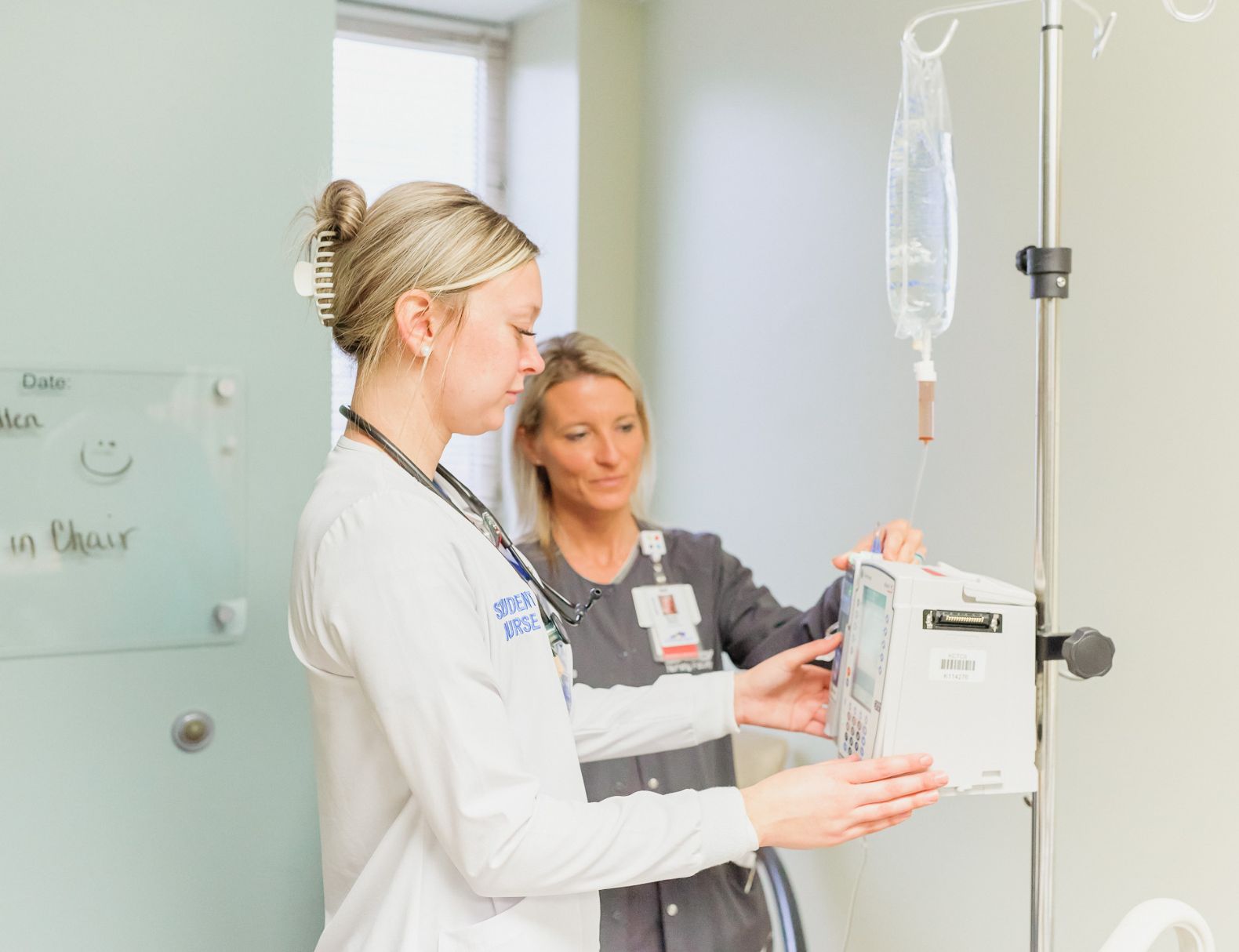Learn key nursing skills and practice them in a variety of real-world settings.
What is Practical Nursing?
Nursing is one of the most exciting and vital careers in today’s economy. If you are interested in helping people a nursing career might be for you! The Practical Nursing Program, approved by the Kentucky State Board of Nursing, combines classroom instruction with hands-on skill labs and supervised clinical instruction in local health care and/or other community facilities. Graduates who meet the program's academic and the Kentucky Board of Nursing requirements may apply to the National Council Licensure Exam (NCLEX) to become licensed practical nurses (LPNs).
In order to become a licensed practice nurse (LPN) students must pass the NCLEX-PN and gain licensure from the state board of nursing.

Getting Started
What are my degree, diploma, and certificate options?
Click here to view the required courses for this credential.
Note: The student can receive credit for NAA 100 Nursing Assistant Skills I (3 credit hours) outside of college. The student must be active on the Kentucky Medicaid Nurse Aide Registry at time of admission.
Click here to view the required courses for this credential.
For more information, please contact: Judy Mitchell, KNAT Coordinator, phone: (270) 824-1810, email: judy.mitchell@kctcs.edu
Click here to view the required courses for this credential.
For more information, please contact: Judy Mitchell, KNAT Coordinator, phone: (270) 824-1810, email: judy.mitchell@kctcs.edu
Click here to view the required courses for this credential.
For more information, please contact: Shannon Allen, Nursing Faculty/Simulation Director, phone: (270) 824-1785, email: shannon.allen@kctcs.edu
How Do I Pay For This?
Worry no more. With the lowest tuition in Kentucky, financial aid options, and a helping hand to guide you through the application process, MCC has you covered. MCC will help you reach your goals at a price that won't break the bank.
How do I apply?
- English 101 - ENG101
- General Psychology - PSY110
- Nurse Aid – NAA100 (unless already on the state nurse aid registry)
- Anatomy and Physiology I – BIO137
- Anatomy and Physiology II – BIO139 *This course can be taken with 1st semester once admitted to the program.
Applicants to the Integrated Nursing Program are chosen through a selective admission process based on cumulative points. In addition to MCC’s Admissions Guidelines, candidates to the program must: View the online pre-admission conference and schedule to take the appropriate entrance exam. The pre-admission conference will guide the applicant in how to receive an application and the requirements for admission.
First-semester entry students will complete the NLN NEX. Applicants must score a minimum of 138. Students may take the NEX two times, then they will be required to wait six (6) months before taking it a third time. After the 3rd attempt, students will have to wait 12 months before taking the exam again.
The applicant will need to submit the online application. A minimum GPA of 2.5 is required and 3.0 is preferred. GPA is only calculated on nursing program prerequisites and general education courses.
Enrollment in the nursing program may be limited because of available healthcare facilities in the community, as well as faculty/student ratios required by the Kentucky Board of Nursing. The admissions point scale is designed to objectively evaluate applicants. Applicants with the highest total points will be admitted to the program.
The Integrated Nursing Program is an RN program that offers an LPN exit point. The student seeking the LPN diploma will apply to the RN program following the guidelines above and included in the pre-admission conference. Then the student would have the option to exit after the second semester of the course and take the NIP 140 Exit Course.
The application deadline is October 15th, for Spring 2025 admission consideration.
If you are interested in our Integrated Nursing Program at Madisonville Community College, you will need to view the online pre-admission conference found at this link - https://youtu.be/eXmLBLm5HOw
During the conference, Dr. Lutz will present the application packet informing you of everything you need to know regarding applying to our nursing program.
The application deadline is October 15th, for Spring 2026 admission consideration.
What Else Do I Need to Know?
Additional Information
*Estimated Program Specific Fees
- eBooks/textbooks = $3,500 for the program
- Uniforms = $75.35/set plus shoes
- Nursing Skills Pack per semester = $81.00 – $730.00
- Simulation Kit = $204.00
- Course software/online resources/testing resources = $1,054
- Clinical Requirements (CPR, fit testing, etc.) = $150
- Background/drug screening management = $105/year
- Licensure, and KBN fees = $850
- Liability insurance per semester = $11.00
- KANS membership = $40/year
- iPad or laptop (any size) = Depending on type
*The tuition, fees, books, supplies, and other expenses estimate includes all courses associated with the ADN program curriculum, from start to finish, as well as clinical placement. The estimate may be lower if the student has transferred courses from another institution. For more information about Madisonville's tuition and charges, please visit the Tuition and Charges webpage. All program cost estimates are subject to change.
The MCC Integrated Nursing program has been granted full approval status by the Kentucky Board of Nursing (312 Whittington Pky., Suite 300 Louisville, KY 40222; 800-305-2042 FREE, http://kbn.ky.gov).
Upon successful completion of the diploma (PN) or AAS degree (RN), application can be made to the board of nursing in the state where the graduate intends to practice. After meeting the board’s eligibility requirements, the graduate can schedule the National Council Licensure Exam for Practical Nurses (NCLEX-PN) or the National Council Licensure Exam for Registered Nurses (NCLEX-RN).
History of a criminal conviction, misdemeanor or felony, could result in denial of licensure. The graduate would need to adhere to specific requirements as mandated by the state board of nursing to which he/she has applied for licensure.
Credits earned at Madisonville will transfer to most universities to allow you to continue your education. You are encouraged to take advantage of transfer pathways available to help you advance your education in nursing.
Nursing at the technical level involves the provision of direct care for individuals and is characterized by the application of verified knowledge in the skillful performance of nursing functions. All students should possess:
- Sufficient visual acuity, such as is needed in preparation and administration of medications, and for the observation necessary for patient/client assessment and nursing care;
- Sufficient auditory perception to receive verbal communication from patients/clients and members of the health team and to assess health needs of people through the use of monitoring devices such as cardiac monitors, stethoscopes, IV infusion pumps, Doptones, fire alarms, etc.;
- Sufficient gross and fine motor coordination to respond promptly and to implement the skills, including the manipulation of equipment, required in meeting health needs;
- Sufficient communication skills (speech, reading, writing) to interact with individuals and to communicate their needs promptly and effectively, as may be necessary in the individual's interest; and
- Sufficient intellectual and emotional functions to plan and implement care for individuals.
Prior to attending clinicals in a health care facility, all students must be free from physical restrictions.
Student must complete the Change in Health Status Form located within the approved vendor after an acute illness or a change in health status and notify the Nursing Program Administration.
Nursing faculty must be notified of anticipated absences and can clarify or answer additional questions if warranted at time of notification.
It is the mission of Madisonville Community College Nursing Division to provide integrated curricula that will enable each student to successfully complete the required nursing program course work. Each graduate is expected to render safe and competent nursing care with emphasis on health promotion activities for individuals across the life span and enhance the quality of their lives as employed citizens of the Commonwealth.
The philosophy of the Integrated Nursing Program is congruent with the Kentucky Community and Technical College System (KCTCS) mission statement. The philosophy incorporates a theoretical basis supported by the works of Christine Tanner’s Clinical Judgment Model (CJM). The model supports the program's philosophy and focuses on the care of diverse populations.
According to Christine Tanner’s model, “clinical judgment is viewed as a problem-solving activity, beginning with assessment and nursing diagnosis, proceeding with planning and implementing nursing interventions directed toward the resolution of the diagnosed problems, and culminating in the evaluation of the effectiveness of the interventions” (Tanner, 2006, p. 204).
Four aspects of the model include four steps:
A. Step one is Noticing, defined as recognizing clinically significant cues. This is a foundational skill for nursing in recognizing relevant data. These skills include systemic review of medical records to organize patient care and focused assessment.
B. Step two is Interpreting, defined as filtering the clinical cues to form an appropriate response. These skills include trending clinical data, recognizing patterns, and determining meaning of the clinical significance of the data.
C. Step three is Responding, defined as taking appropriate action through planning and interventions. These skills include priority interventions and identifying possible problems.
D. Step four is Reflecting, defined as determining if the patient has responded the way intended and reflecting on what occurred based on the nurse’s actions. These skills include two reflections: patient reflection – patient’s response to the plan of care, and the nurse refection on practice – the nurse will identify errors in judgment and apply to future care of patients (Tanner, 2006) (Rischer, 2021)
Learning in an educational setting is enhanced by a teacher/student relationship in which the teacher’s responsibility is to structure and facilitate optimal conditions for clinical judgment and learning through clearly defined student learning outcomes. The student brings to this relationship the willingness to learn and is accountable for his/her education. Recognizing that both the rate and style of learning differ with individuals, various strategies are utilized to facilitate the achievement of student learning outcomes, attainment of maximum potential, and promotion of continued learning.
References:
Tanner, C. (2006). Thinking like a nurse: a research-based model of clinical judgment in nursing. Journal of Nursing Education, 45(6), 204-211. doi:10.3928/01484834-20060601-04.
Clinical facilities utilized by the Madisonville Nursing Program require students to have clear background checks and drug screens. Clinical facilities can deny student participation in clinical/observation rotations due to these results. Since clinical participation is required to meet the nursing course outcomes, if a facility denies a student admittance to clinical, the student will not be able to progress in the nursing program. Madisonville does not accept responsibility for any student being ineligible for clinical participation based on background checks or drug screens and continued enrollment in the ADN program.
Percentage of graduates that pass the NCLEX-PN on the first attempt.
- 2022= 89%
- 2023= 100%
- 2024= 100%
PN Program Completion Rate
- 2021-2022= 90%
- 2022-2023= 100%
- 2023-2024= 100%
Employment Rate of PN Graduates
- 2024= 100%
Length of Program
You can earn an associate in applied science degree in two years if you maintain full-time status.
This information should not be considered a substitute for the KCTCS Catalog. You should always choose classes in collaboration with your faculty advisor to ensure that you meet all degree requirements.

